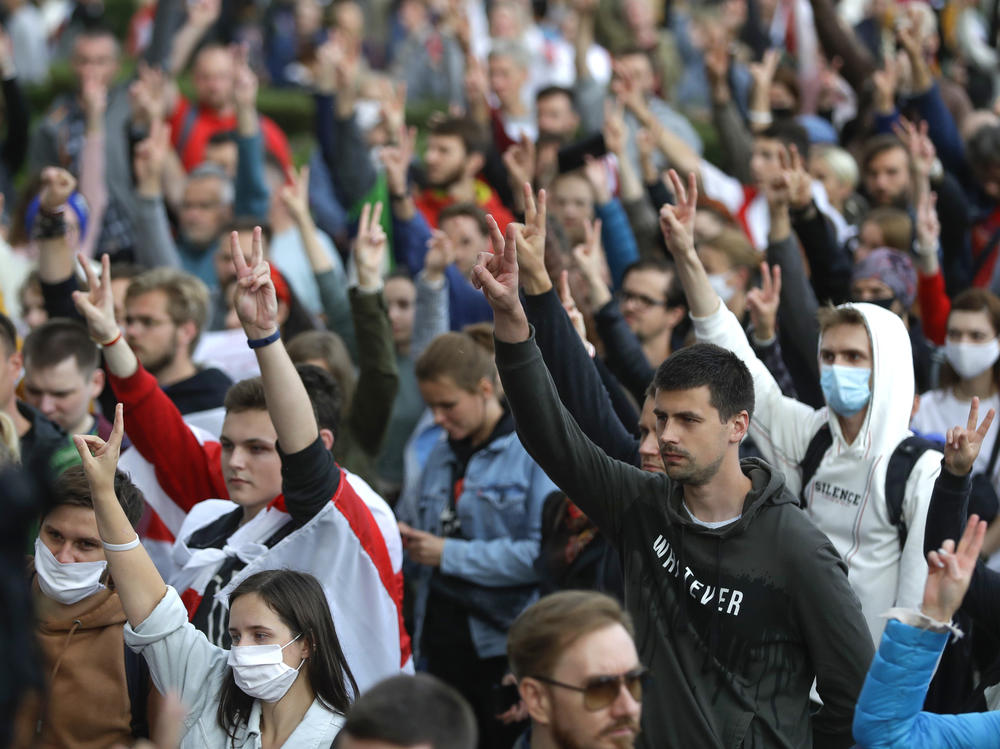Section Branding
Header Content
'Tightening The Screws': Belarus' Lukashenko Shows No Sign Of Bending To Protests
Primary Content
Belarusian President Alexander Lukashenko appears to be regaining the upper hand after mass demonstrations against his reelection in an Aug. 9 vote criticized as neither free nor fair by the U.S. and the European Union.
For opposition supporters, a sense of dread is replacing the euphoria of some of the largest protests in Belarus since its independence from the Soviet Union in 1991.
"The government is now tightening the screws very tightly, and it's becoming quite dangerous," said Yelena, 44, a volunteer in the campaign office of Viktor Babariko, one of Lukashenko's challengers in the election who was barred from running and jailed on fraud charges.
"This week people continued to go out on the street, despite all the threats and warnings that they would be arrested," said Yelena, who asked that her last name not be used because she faces persecution as an opposition activist.
"It's become scary because they can go after you simply for things like the color of your clothes," she said. "It's like George Orwell's 1984. They can punish you for wearing red and white, or a white bracelet, or a T-shirt with a slogan."
Belarus' white-red-white flag has become a symbol of the opposition to Lukashenko, who, after becoming president in 1994, introduced a green and red flag reminiscent of the nation's Soviet-era flag.
Red and white became the colors of Svetlana Tikhanovskaya, the opposition candidate who united the three campaigns of her jailed husband Sergei Tikhanovsky, Babariko and Viktor Tsepkalo, a former ambassador to the U.S. who had to flee the country. After the election, Tikhanovskaya too was forced to leave Belarus, and is now based in neighboring Lithuania.
What's left of the organized opposition to Lukashenko is a "coordination council" that wants to facilitate a dialogue with the regime for a peaceful transition of power. Lukashenko refuses to talk to the group, and the authorities have opened a criminal case against it.
On Wednesday, investigators called in Svetlana Alexievich, Belarus' Nobel literature laureate and a council member, for questioning. Earlier two leaders of the council were given 10-day jail sentences for allegedly holding an illegal rally.
"We will not be silenced and forget what happened. We demand all those responsible be investigated and brought to justice, and that law and justice be restored," Maria Kolesnikova, one of the council's leaders, said in a video appeal this week.
In the first days of the protests, police arrested almost 7,000 demonstrators. When they were released from prison, many of them spoke of being subjected to indiscriminate beatings and torture.
The protests and strikes that followed rattled the Lukashenko regime, says Artyom Shraibman, a political analyst in Minsk, but now the demonstrations in the capital are not as widespread and visible as before.
It's still too early to say that Lukashenko has won, Shraibman says, because protesters could turn out in force if the crackdown is too harsh.
"Until the protests have subsided completely, we cannot say they're over because they're basically like fire," Shraibman said. "In theory, the authorities are capable of putting some more gasoline on the fire."
The opposition council, he said, has limited room for maneuver.
"Probably the best thing that they can do is resist all of Lukashenko's efforts to drag them into framing the conflict as geopolitical," Shraibman said.
On Friday, Lukashenko visited a cheese factory in the city of Orsha, draping a white cape over his suit as he inspected the machinery. It wasn't long before he was warning dairy workers that American F-16 fighter planes were now just a 20-minute flight away from the border — maybe even armed with nuclear weapons, he said.
"They don't need Belarus. Belarus is just a springboard, as usual, to get to Russia," Lukashenko said, referring to Swedish, French and German invasions over the centuries that all led through Belarus.
Lukashenko has been talking up the threat from Belarus' NATO neighbors ever since mass protests broke out after the disputed election, which he claimed to have won in a landslide. Before the vote, Lukashenko had warned that it was enemies based in Russia who were trying to divide Belarus.
A political survivor, Lukashenko has now secured the Kremlin's backing while branding his domestic opponents as pawns of the West. On Thursday, Russian President Vladimir Putin said that on Lukashenko's request, Russia had put together a rapid-reaction force that could intervene in Belarus if necessary. That same evening, Lukashenko's riot police detained more than 260 people at a peaceful rally in Minsk, including 50 journalists.
But Putin's support for Lukashenko has alienated many Belarusians, who generally have warm feelings toward Russia.
"We expected something else. We always assumed that Putin and Russia would support the Belarusian people and not one particular individual, especially when they see how hard it is for Belarusians right now," said opposition activist Yelena.
She said she hopes the weather is good this weekend so people turn out for renewed protests across the country.
Copyright 2020 NPR. To see more, visit https://www.npr.org.

